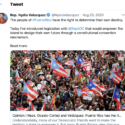Congressional Representative Nydia Velazquez proposed a status convention for Puerto Rico… in 2007. Also in 2009 and 2020. She has also called it a “Constitutional Convention.”
A constitutional convention is a gathering to write a constitution. The United States had a constitutional convention in 1787. A constitutional convention has often been part of the process of a territory’s becoming a state. For example, Ohio had one in 1802.
Territories have generally had to come up with a state constitution, which the U.S. Congress must approve before the territory is admitted as a state. Often, state constitutions include the possibility of future constitutional conventions to make changes to the constitution.
The thing is, Puerto Rico’s constitution has already been written and approved by Congress. This happened in 1952, at the Constitutional Convention which began in 1951. At that time, as is often the case, the rules for any future constitutional convention were laid out:
“The Legislative Assembly, by a concurrent resolution approved by two-thirds of the total number of members of which each house is composed, may submit to the qualified electors at a referendum, held at the same time as a general election, the question of whether a constitutional convention shall be called to revise this Constitution. If a majority of the electors voting on this question vote in favor of the revision, it shall be made by a Constitutional Convention elected in the manner provided by law. Every revision of this Constitution shall be submitted to the qualified electors at a special referendum for ratification or rejection by a majority of the votes cast at the referendum.”
By calling for a Constitutional Convention outside of these rules, Velazquez ignores the Constitution of Puerto Rico. A constitutional convention cannot, under Puerto Rico’s Constitution, be called by a congressperson from New York.
What is a status convention?
Here’s how Velazquez and Alexandria Ocasio-Cortez explained it:
“The legislation would prompt Puerto Rico’s Legislature to create a Status Convention whose delegates would be elected by Puerto Rican voters. This body would develop a long-term solution for Puerto Rico’s status, be that statehood, independence, free association or any option other than the current territorial arrangement. What the convention negotiates and puts forth would then be voted on in a referendum by the people of Puerto Rico before presentation to the U.S. Congress. The key is that this framework would be developed by Puerto Ricans and for Puerto Ricans, not dictated to them like so many previous policies.”
This plan obviously ignores the fact that the recent plebiscite was developed by Puerto Ricans and for Puerto Ricans, rather than being dictated by the U.S. Congress. The legislature of Puerto Rico could at any time they chose create a Status Convention. Instead, they chose to give the voters of Puerto Rico the direct power to choose the political status they preferred. In 2012, 2017, and 2020, the voters chose statehood.
As Andrés L. Córdova of Inter American University of Puerto Rico pointed out, “As a collective body, Puerto Rico has exercised its right to self-determination in every electoral event since the approval of the 1952 Constitution and subsequent general elections and local plebiscites, albeit incompletely and inconclusively. This is precisely the importance of the November 3 ‘statehood yes or no’ referendum. It is only from the heights of the worst kind of legal conceptualism that one can argue that as a matter of political reality the People of Puerto Rico have not exercised their right to self-determination.”
Córdova went on to say, “It is highly ironic that two Congresswomen from New York aim to provoke the exercise of the sovereign power of Congress, to allow the people of Puerto Rico to exercise their alleged natural right to self-determination. If in fact there were such a thing, we would certainly not need congressional approval to exercise it.”
No sovereignty
Puerto Rico has a representative in Congress, the Resident Commissioner, Jenniffer Gonzalez-Colon. She has introduced bills calling for statehood for Puerto Rico.
As the League of United Latin American Citizens (LULAC) said in a statement, “As with all U.S. citizens living in any of the 50 states, the Puerto Rican people should have their voices heard by voting as the means to express their wishes. A voter in Virginia would not vote for an issue in Texas or visa versa. Congress should listen to the will of the people. If they choose statehood, they should be admitted.”
Puerto Rico voters chose statehood.
Velazquez wants to ride roughshod over that choice. Ignoring not only the voters of Puerto Rico but also her colleague Gonzalez-Colon, the legitimately elected representative of those voters, Velazquez has repeatedly proposed a solution that could properly have come only from the legislature of Puerto Rico.
Puerto Rico made a different choice.
As a territory, Puerto Rico has no sovereignty. Congress must admit Puerto Rico as a state; no one else can do that. If Velazquez proposes her Constitutional Convention yet again in the current Congress, she will be taking advantage of the territory’s lack of sovereignty to reject the legitimate vote and impose her own will on Puerto Rico.








No responses yet